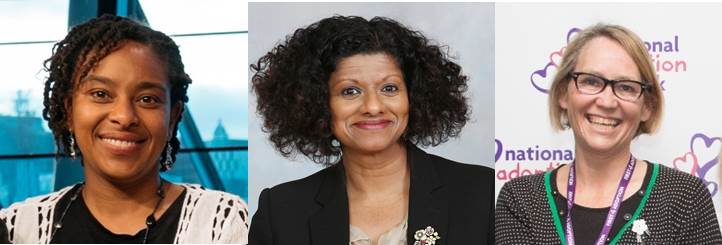
L-R Dr Jasmine Chin*, Renuka Jeyarajah-Dent, Dr Ana Draper
Renuka Jeyarajah-Dent, Coram’s Deputy CEO, manages Coram’s Therapeutic Team, providing a range of essential services to help children thrive. Dr Jasmine Chin is the Clinical Lead for Coram and heads up Coram’s creative therapies work, and Dr Ana Draper is Clinical Lead for post-adoption support at Kent County Council. The team is supported by Dr Jeff Mesie, Head of Impact and Evaluation, Kevin Yong, Managing Director of Coram-i consultancy services, and Euston Copeland, Coram’s Safeguarding Lead.
Renuka, who is also Chartered Educational Psychologist, said: “Supporting children’s mental health and wellbeing is at the heart of Coram’s work to ensure children get the best possible start in life. We know that there are a range of factors that can affect children’s mental health such as the breakdown of extended families and communities, the demands of school, the influence of new technologies, the lack of play and sport facilities, and access to drugs and alcohol. We also know that early intervention can vastly improve the outcomes for vulnerable children.” Coram’s clinicians offer a number of services including innovative art and music therapy, clinical psychology, systemic family therapy, occupational therapy and other mental health practitioners.
Coram’s therapeutic services operate from a variety of settings in the community including specialist adoption support services in Kent, art and music therapists working with special schools in Camden and the Youth Offending service in Kensington and Chelsea. The team supports young parents and offers training to secondary school pupils. It also provides consultation to professionals and families regarding adoption, trauma and unaccompanied migrant children.
“Coram has been working with children for 300 years. This historical perspective has given us an incredibly rich insight into what children need to thrive and has informed our approach across the board”, said Renuka. “We recognise the strength of a good attachment formed as early as possible and the importance of available and dependable care. It is important that children feel the warmth of a relationship and feel special to someone who can know and care for them.”
Renuka also highlights the importance of a range of opportunities for children to learn and play so that “individual talents can be discovered and developed” as well as the stability of long-lasting friendships and connections.
Coram believes passionately in the need to empower parents so that they can give their children a secure start in life. Renuka recommends: “Get to know your children by spending time with them. If you really know your child then you can trust your instincts when you feel things are going wrong.” She also recommends contacting the GP or school if there are any concerns: “There is much that can be done through early help.”
Many children and young people have worries as they grow up. Renuka advises that the most important thing for children in this situation is to tell someone: “Tell someone you trust, it might be a friend, parent or teacher. What you are suffering will not be unusual to people who know about mental health issues – you are not alone.”
*Photo by Helen Murray
